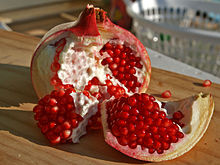Punicic acid: Difference between revisions
Rifleman 82 (talk | contribs) m fix pubchem |
m Citation maintenance. You can use this bot yourself! Please report any bugs. |
||
| Line 20: | Line 20: | ||
Punicic acid is a [[Polyunsaturated fatty acid#Conjugated fatty acids|conjugated linolenic acid]] or ClnA; i.e. it has three [[Conjugated system|conjugated double bonds]]. It is chemically similar to the [[conjugated linoleic acid]]s, or CLA, which have two. |
Punicic acid is a [[Polyunsaturated fatty acid#Conjugated fatty acids|conjugated linolenic acid]] or ClnA; i.e. it has three [[Conjugated system|conjugated double bonds]]. It is chemically similar to the [[conjugated linoleic acid]]s, or CLA, which have two. |
||
In lab rats, it was found that punicic acid was converted to the CLA [[rumenic acid]] (9Z11E-CLA).<ref name=Tsuzuki> |
In lab rats, it was found that punicic acid was converted to the CLA [[rumenic acid]] (9Z11E-CLA).<ref name=Tsuzuki> |
||
{{cite journal| journal=J Nutr|year= 2006|month= Aug|volume=136|issue=8|pages= |
{{cite journal| journal=J Nutr|year= 2006|month= Aug|volume=136|issue=8|pages=2153–9| accessdate= 2007-01-23|title=Conjugated linolenic acid is slowly absorbed in rat intestine, but quickly converted to conjugated linoleic acid| author= Tsuzuki T, Kawakami Y, Abe R|url=http://jn.nutrition.org/cgi/content/abstract/136/8/2153|pmid=16857834}}</ref> In vitro, it shows anticancer activity against prostate cancer cells.<ref name=Lansky>{{cite journal |author=Lansky E, Harrison G, Froom P, Jiang W |title=Pomegranate (Punica granatum) pure chemicals show possible synergistic inhibition of human PC-3 prostate cancer cell invasion across Matrigel |journal=Invest New Drugs |volume=23 |issue=2 |pages=121–2 |year=2005 |pmid=15744587| accessdate= 2007-01-23 |doi=10.1007/s10637-005-5856-7}}</ref> OLETF rats—a strain which becomes obese—remained relatively lean when punicic acid was added to their feed.<ref>{{cite journal |author=Arao K, Wang Y, Inoue N, Hirata J, Cha J, Nagao K, Yanagita T |title=Dietary effect of pomegranate seed oil rich in 9cis, 11trans, 13cis conjugated linolenic acid on lipid metabolism in obese, hyperlipidemic OLETF rats |journal=Lipids Health Dis |volume=3 |issue= |pages=24 |year= |pmid=15533261|accessdate= 2007-01-23 |doi=10.1186/1476-511X-3-24}}</ref> [[Adipose tissue|Fat cells]] undergo [[apoptosis|programmed cell death]] when exposed to punicic acid from bitter-gourd oil.<ref name=Nishimura >{{cite journal |author=Nishimura K, Tsumagari H, Morioka A, Yamauchi Y, Miyashita K, Lu S, Jisaka M, Nagaya T, Yokota K |title=Regulation of apoptosis through arachidonate cascade in mammalian cells |journal=Appl Biochem Biotechnol |volume=102-103 |issue=1-6 |pages=239–50 |year= |pmid=12396127|accessdate=2007-01-29 |doi=10.1385/ABAB:102-103:1-6:239}}</ref> |
||
==See also== |
==See also== |
||
Revision as of 14:09, 7 June 2008
Template:Chembox new Punicic acid (also called trichosanic acid) is a polyunsaturated fatty acid, 18:3 (n-5). It is named for the pomegranate, (Punica granatum), and is obtained from pomegranate seed oil. It is also found in the seed oils of snake gourd and bitter gourd.[1]
Punicic acid is a conjugated linolenic acid or ClnA; i.e. it has three conjugated double bonds. It is chemically similar to the conjugated linoleic acids, or CLA, which have two. In lab rats, it was found that punicic acid was converted to the CLA rumenic acid (9Z11E-CLA).[2] In vitro, it shows anticancer activity against prostate cancer cells.[3] OLETF rats—a strain which becomes obese—remained relatively lean when punicic acid was added to their feed.[4] Fat cells undergo programmed cell death when exposed to punicic acid from bitter-gourd oil.[5]
See also
References
This article has an unclear citation style. (September 2007) |
- ^ Cyberlipid. "POLYENOIC FATTY ACIDS". Retrieved 2007-01-11.
- ^
Tsuzuki T, Kawakami Y, Abe R (2006). "Conjugated linolenic acid is slowly absorbed in rat intestine, but quickly converted to conjugated linoleic acid". J Nutr. 136 (8): 2153–9. PMID 16857834. Retrieved 2007-01-23.
{{cite journal}}: Unknown parameter|month=ignored (help)CS1 maint: multiple names: authors list (link) - ^ Lansky E, Harrison G, Froom P, Jiang W (2005). "Pomegranate (Punica granatum) pure chemicals show possible synergistic inhibition of human PC-3 prostate cancer cell invasion across Matrigel". Invest New Drugs. 23 (2): 121–2. doi:10.1007/s10637-005-5856-7. PMID 15744587.
{{cite journal}}:|access-date=requires|url=(help)CS1 maint: multiple names: authors list (link) - ^ Arao K, Wang Y, Inoue N, Hirata J, Cha J, Nagao K, Yanagita T. "Dietary effect of pomegranate seed oil rich in 9cis, 11trans, 13cis conjugated linolenic acid on lipid metabolism in obese, hyperlipidemic OLETF rats". Lipids Health Dis. 3: 24. doi:10.1186/1476-511X-3-24. PMID 15533261.
{{cite journal}}:|access-date=requires|url=(help)CS1 maint: multiple names: authors list (link) CS1 maint: unflagged free DOI (link) - ^ Nishimura K, Tsumagari H, Morioka A, Yamauchi Y, Miyashita K, Lu S, Jisaka M, Nagaya T, Yokota K. "Regulation of apoptosis through arachidonate cascade in mammalian cells". Appl Biochem Biotechnol. 102–103 (1–6): 239–50. doi:10.1385/ABAB:102-103:1-6:239. PMID 12396127.
{{cite journal}}:|access-date=requires|url=(help)CS1 maint: multiple names: authors list (link)

